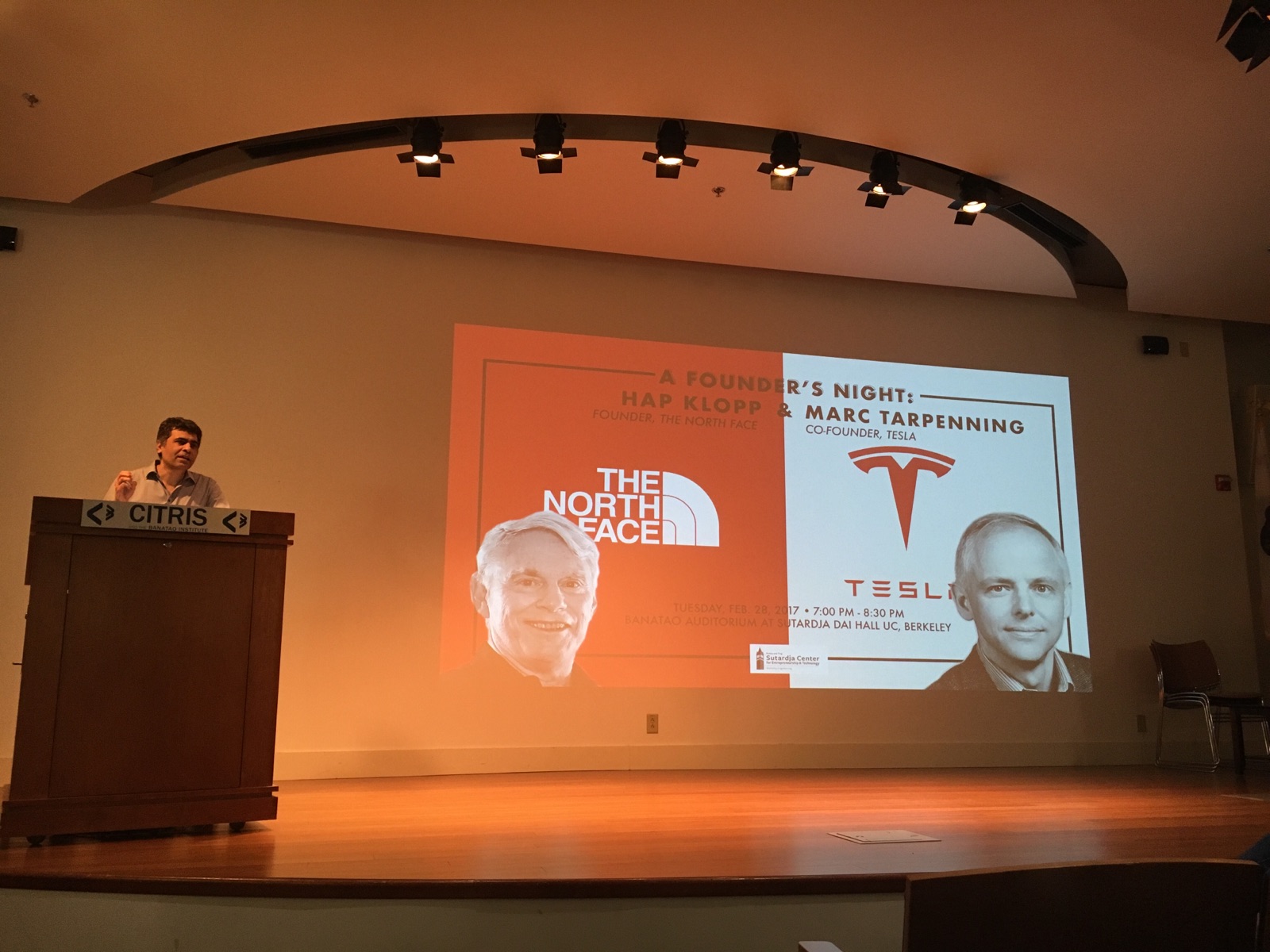
What is life like as an entrepreneur? What does failure mean to you? How do you find the right cofounders? These were a few of the many questions answered on Tuesday, February 28th at Banatao Auditorium by the Co-Founder of Tesla, Marc Tarpenning, and the Founder of the North Face, Hap Klopp. Throughout the evening they discussed what the key ingredients are to make it in Silicon Valley.

Marc Tarpenning started off the evening discussing what the life as an entrepreneur looks like and the founding of Tesla. Showing images of hats of all shapes, sizes, and colors, Tarpenning revealed that as an entrepreneur you have many roles: “When you first start a company, you have to wear many hats. At times you may play several roles, all simultaneously. You might be the head of engineering, while being the head of media, legal, and PR all at the same time. It’s fun because you get to see all the nuances of how a company works…you’re the boss, but it’s a lot of work.”
Starting a company from scratch is not an easy job. Especially with limited resources and a small team, entrepreneurs are forced to play many roles. They must oversee a number of different departments and projects as their vision and company grow, and take care of tasks ranging from raising millions through venture capital to simply taking the trash out at the end of the day. Successful entrepreneurs are the ones who are able to thrive off this multidisciplinary role.
Furthermore, Tarpenning discussed five important steps an entrepreneur must take in order to have a successful company: a good problem, disruption, a strong plan, a visionary team, and execution.
The first is simply choosing a good problem: “It doesn’t have to be a big problem. But it has to be something you care about.” Starting a company is far from easy, so it is extremely important to find a problem you are passionate about. As Tarpenning puts it, “it consumes your life.” To make it as a successful entrepreneur, you need inspiration, perseverance, commitment, and pure passion for the company you are starting.
He also told the audience to “Look for disruption and ask yourself, what is changing?” For example, Tesla was completely disruptive. Cars have been made for over a hundred years, but very few companies were working on electric cars.
After you have a disruptive idea that you are passionate about, it is essential to come up with a plan: “Need to understand what you are doing before you make big decisions. Before we pitched Tesla, we did ample market research, had the technology figured out, understood regulatory compliance, and figured out what steps we needed to take.” Creating a plan is a critical preliminary step for starting a company. It forces you to review everything such as your value proposition, marketing plan, financial plan and staffing plan, set realistic goals, monitor progress, and overall hold yourself accountable.
The next step is convincing others of your vision. Big projects require a lot of people. This connects perfectly with the next step, “build a company, not just a product.” Tarpenning noted the importance of company culture and hiring the right people. You need a visionary team to help you bring your idea to life.
Lastly, execution is everything. Even if you have a brilliant idea, it is close to worthless without stellar execution.
Next, Hap Klopp took the stage and discussed his thoughts on failure. He started off asking the audience how many people want to be entrepreneurs and/or are currently entrepreneurs. With an audience filled with ambitious students from UC Berkeley, more than 80% of the students quickly raised their hands. Klopp chuckled saying, “You all are the least qualified to be entrepreneurs”.
Klopp’s theory was that since the audience went to school at UC Berkeley, they probably did not fail very much. The interesting thing about entrepreneurship is that it is a game about failing. As Tarpenning mentioned earlier, execution is very important. However, many people fail to execute because they fear failing in the process. Klopp mentioned design thinking, and the importance of “failing forward, and failing quick.” Failing is one of the most important components to success, as you need to fail in order to learn from your mistakes and grow. “Entrepreneurs who are poor at executing are probably poor at failing,” said Klopp.
As an entrepreneur, you are forced to execute the scientific method: creating a hypothesis or brainstorming a idea, making a prototype, testing it on consumers, and bringing it to market. Unfortunately, your idea may not be something customers need, or your prototype may not turn out the way you intended. This is where the “failure” and learning comes from. Entrepreneurs are able to quickly learn from their failures and pivot their ideas.
Klopp also mentioned the “perfection paralysis” in which there is no time for perfect information. “Perfect is the enemy of good as it takes twice as long and costs three times as much,” said Klopp. Next, Klopp revealed a few ways to learn from failure quickly and be successful. The first was doing market research and finding the value of your product or service: “Don’t just try to make the price cheaper. Find what the customer truly values and is interested in. Understand your customer and what they want.”
Next, is to keep your plans flexible as everything is always changing. It is important to keep your final destination in mind and constantly change paths to reach your destination.
Lastly, “hire motivated people!” Hiring motivated people provides long-term benefits since self-motivation is an internal characteristic that is less likely to fade. Most self-motivated individuals will work without constantly being watched over, and will continuously work hard, efficiently, and have a high productivity level. Self-motivated people are also likely to be top performers, and loyal to your company. Moreover, skills can be taught, but self-motivation cannot be. Thus, it is important to hire for attitude and train for skills.

The event ended with a fireside chat with the audience:
- How do you deal with failure?
Marc: “What did you learn from it? Why didn’t it work? You should not really consider your failures to be failures. Even though you may not get an answer you want, you still get an answer.”
Hap: “Success is doing what you want to the best of your ability. Everyone has their agendas. You will never reach everyone else’s expectations. Don’t think you will change the world necessarily, but know you will change something.”
- How do you find the right the team? Co-founders?
Marc: “Not being afraid of working with people who are smarter than you. When someone is not working out, it is incredibly important to cut your losses (especially when you’re small). It is hard, but it is important!”
Hap: “A lot of Beer! Sit down and talk with people. Look for people who are competitive and smart. It’s nice being surrounded by bright people. You don’t want to lose that. If their philosophy and values are consistent with yours, then they are good. You want a team where you can talk, argue, and discuss problems of the world.”
- What is one thing you wish you knew when you were in college?
Marc: “Failing is okay. It took me a while to understand that. I worked/watched so many start-ups fail. I wish I understood it earlier.”
Hap: “It is going to be hard! Building a company doesn’t happen overnight. You are going to feel down and feel like a loser sometimes. It takes time to accept this.”
